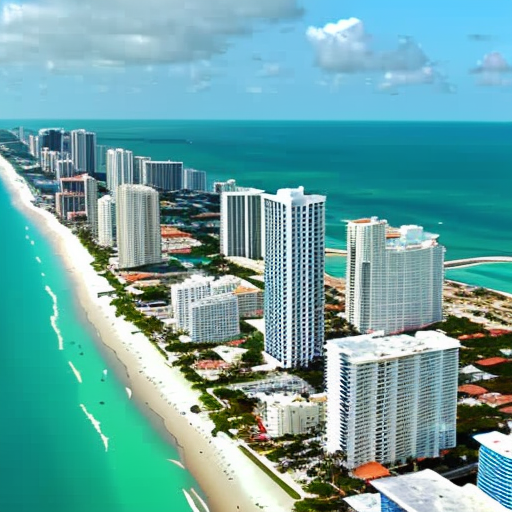The Miami Real Estate Market’s Resilience In The Face Of Economic Downturns
It’s no secret that the economy can be unpredictable – but when it comes to real estate, Miami has proven to be an exception. Despite economic downturns, the Miami real estate market has stayed strong. It’s a city that’s resilient in the face of economic hardship, and its property values have continued to rise even when other markets have been struggling. In this article, we’ll take a closer look at why Miami is so successful in weathering economic storms and how its unique features make it a safe haven for investors.
The first thing you notice about Miami is its vibrant culture and diverse population. There is no shortage of entertainment options, from world-class restaurants to lively nightlife spots. This makes it an attractive destination for both investors and those looking for a place to live or vacation. Not only does this provide a steady influx of potential buyers and renters, but it also means that prices remain relatively stable despite any changes in the economy.
Finally, there are several factors that help keep the Miami real estate market resilient and healthy even during turbulent times. For instance, taxes are low compared to other cities across the country; this helps developers keep costs down while still turning a profit. Additionally, high-quality construction ensures that properties remain desirable despite changing trends in the marketplace.
The Miami real estate market resilient has proved itself against economic downturns due to its combination of cultural attractions, reasonable taxes and high-quality construction standards. In this article we’ll explore each of these elements in more detail – as well as what makes them so important for investors looking for security in uncertain times.
Definition Of A Real Estate Market
Real estate refers to land and any physical property or improvements attached to it, including buildings, fences, and other structures. It also includes the rights associated with the land and its use. A real estate market is a place where people buy, sell, lease, and develop properties. It is a dynamic environment that can be influenced by local economic conditions, government policies, laws, and regulations.
The real estate market encompasses all aspects of buying and selling property. It includes residential homes, commercial buildings, industrial sites, vacant lands, farmland, recreational facilities and much more. Real estate agents help facilitate transactions between buyers and sellers by providing accurate information about the types of properties available in a particular area or region. They assist clients in finding the perfect property for their needs while offering advice on pricing, financing options and legal requirements. As such, an understanding of the real estate market is necessary for anyone considering investing in a property or building project.
Historical Trends In Miami
The Miami real estate market has long been a destination for investors and homebuyers alike. Over the years, Miami has consistently proven to be one of the most resilient markets in the country when it comes to economic downturns. This is partially due to its historical trends in real estate values, which have remained relatively stable over time.
Historically, Miami’s real estate market has grown steadily since the mid-2000s. Despite some fluctuations in prices due to economic changes, housing values have generally held their own. This is significant as it indicates that Miami is a reliable source of investment capital even during times of financial uncertainty. Additionally, due to its location on the east coast of Florida and its proximity to major cities like New York City, it attracts both domestic and international buyers who are looking for a safe haven for their investments. These factors have all contributed to making Miami an attractive option for those looking for steady returns on their real estate investments.
Factors Contributing To Resilience
Transition from previous section: The Miami real estate market has maintained a consistent level of growth over the years, largely due to its resilience in the face of economic downturns.
What factors have contributed to this remarkable resilience? Economic stability, local regulations and investor confidence have all played a role.
The Miami economy has remained relative stable despite fluctuating markets. This has been due in part to the city’s focus on diversifying its industries. The area is home to several large corporations, including American Airlines and Royal Caribbean Cruise Lines, as well as many small businesses that provide goods and services to local residents and visitors alike. These companies and businesses help sustain the local economy by providing jobs, revenue and investment opportunities.
Local regulations have also played an important role in maintaining the Miami real estate market’s resilience. The state of Florida has established laws that protect buyers and sellers from unfair practices while encouraging investments in real estate. These regulations include restrictions on rent prices, limits on loan amounts and requirements for disclosure of property details prior to purchase or sale transactions. All of these measures help ensure that buyers are informed about their purchases and that sellers are able to get fair prices for their properties.
Finally, investor confidence has been key in maintaining the Miami real estate market’s resilience. Investors recognize the potential for long-term profits from rental income or capital appreciation when purchasing property in Miami. Many investors also take advantage of financing options such as adjustable rate mortgages (ARMs) or interest-only payments when acquiring properties here; these flexible terms can provide an attractive return on investment while limiting initial capital outlay costs.
Overall, these factors have helped maintain the Miami real estate market’s stability throughout economic cycles, allowing it to remain resilient even during periods of economic downturns. This stability makes it an attractive option for both investors looking for long-term returns as well as individuals seeking a place to call home.
Impact Of Local Government Policies
Local government policies have had a major impact on the Miami real estate market’s resilience during economic downturns. These policies have encouraged investment and development in the city, helping to keep the real estate market strong during turbulent times. For example, tax incentives and zoning laws have allowed developers to build infrastructure and increase housing supply, which has kept prices relatively stable. In addition, programs such as urban renewal initiatives and public-private partnerships have stimulated growth in the region by providing additional capital for projects.
These measures have been instrumental in allowing the city of Miami to remain resilient during difficult economic periods. The combination of local government policies, supportive public sentiment, and a healthy economy has enabled the Miami real estate market to weather storms that may otherwise have caused significant damage. Though there is much work still to be done to ensure long-term stability, local government policies have played an important role in keeping this vibrant market afloat.
Role Of Investors And Developers
Despite the challenges posed by local government policies, the Miami real estate market has continued to demonstrate remarkable resilience in the face of economic downturns. This is primarily due to the involvement of investors and developers who are continually seeking out opportunities in this vibrant market.
Investors play an important role in providing capital for real estate transactions, allowing developers to purchase and develop properties that may otherwise be unavailable due to lack of funding or other restrictions. Investors can also provide additional capital for renovations or improvements, making it possible for developers to achieve higher returns on their investments. Developers are then able to capitalize on these opportunities and create value by rehabilitating existing properties or constructing new developments that meet the demands of buyers in the area.
By providing both capital and expertise, investors and developers have been able to ensure that the Miami real estate market remains a viable option for those looking for an opportunity despite challenging economic times. These individuals are essential components of any successful real estate venture and continue to ensure that Miami remains a competitive market.
Factors That Affect Home Prices
When analyzing the Miami real estate market, it’s important to consider the factors that influence home prices. There are many factors that can cause home-price fluctuations, including local economic conditions, population growth and demographic changes, availability of financing options, and seasonal variations.
Real estate analysts must also consider the level of competition in the area. Factors such as the number of available homes on the market and their availability for sale can have an impact on prices. Additionally, certain areas may experience higher demand than others due to their proximity to amenities like beaches or shopping centers. All of these factors can affect pricing trends in any given area.
Overall, understanding these influences is essential for predicting future developments in the Miami real estate market. It also helps investors make informed decisions about when to invest or sell a property.
Types Of Properties In The Miami Real Estate Market
The Miami real estate market is comprised of a wide variety of property types. Condo buildings, single-family homes, and luxury apartments make up the bulk of the real estate landscape in Miami. Condo buildings are popular among those looking for a low-maintenance lifestyle and easy access to amenities. Single-family homes provide more space and privacy than condo buildings, but come with increased responsibilities in terms of maintenance and upkeep. Luxury apartments offer upscale living with numerous amenities within walking distance.
Each type of property offers its own advantages, so it’s important to consider your needs when deciding which type is right for you. Location also plays an important role in choosing the right property type for your needs. Many properties close to downtown offer quick access to shops, restaurants, and entertainment venues. Additionally, properties further away from downtown may be more affordable but still conveniently located near public transportation or other attractions. Ultimately, each person’s unique needs will determine which type of property fits their lifestyle best.
Supply And Demand Dynamics
Despite the economic downturns that have affected the Miami real estate market, it has proven to be quite resilient. This is largely due to its supply-demand dynamics; there is a very large and diverse property supply, as well as a steady demand for properties. Understanding these factors is key to evaluating the market’s resilience.
The property supply in Miami has been steadily growing over the years, both in terms of quantity and quality. There are now many options available for buyers, ranging from luxury high-rises to suburban single-family homes. This increased variety of housing options has provided a buffer against market disruptions caused by economic recession or changes in demand trends.
In addition to an ample property supply, there is also a consistent demand for properties in Miami. While some areas may be more popular than others, overall the city remains desirable to potential buyers looking for a place to live and invest in real estate. The combination of these two factors – ample supply and consistent demand – helps explain why the Miami real estate market has been able to remain so resilient despite economic downturns.
Changes In Available Financing Options
During economic downturns, the availability of financing options is often significantly reduced. This can have a negative effect on the Miami real estate market, as it reduces the number of potential buyers who can access mortgage financing. However, in recent years there has been an increase in loan modification programs that have enabled more qualified buyers to obtain mortgages. These programs provide incentives for lenders to relax their credit requirements and offer borrowers more favorable terms. This has allowed more people to enter the market, allowing them to take advantage of lower prices and helping to buoy the market during difficult times. Additionally, this increased access to financing has also benefited existing homeowners by providing them with options for refinancing or forbearance if they experience financial difficulties. As a result, the Miami real estate market has become more resilient in the face of economic downturns.
Impacts Of Natural And Man-Made Events On Property Values
Natural disasters and man-made events can have a significant impact on the Miami real estate market. Hurricanes, floods, and other natural disasters can cause severe damage to homes and property in the area, resulting in decreased property values. Similarly, man-made events such as civil unrest or terrorist attacks can lead to a decrease in demand for homes in certain neighborhoods or regions, further affecting property values.
However, despite these potential impacts, the Miami real estate market has proven to be incredibly resilient over time. Despite any drops in prices due to natural or man-made events, markets typically recover quickly once stability is restored. This resilience is one of the main reasons why Miami continues to be an attractive place for investors looking to purchase long-term real estate investments.
Renters Versus Homeowners In The Miami Market
The Miami real estate market has been resilient throughout economic downturns, with both renters and homeowners finding success in the market. Renters have seen a steadily increasing demand for rental properties in the Miami area, as home prices remain relatively high. This trend is also reflected in the increased number of people moving to the Miami area, mostly in search of affordable housing. Homeowners have likewise seen an increase in value due to the attractive prices of homes in the area. While there have been some fluctuations over time, overall property values have remained steady and even appreciated slightly since 2016.
Overall, both renters and homeowners are able to take advantage of Miami’s real estate market. The steady demand for rental properties ensures that landlords can find tenants easily and make a decent profit from their investments. Similarly, homeowners can benefit from stable values and appreciate their properties over time as more people move into the city. With the right investments and research, those looking to buy or rent in Miami can come out ahead financially.
Effectiveness Of Different Strategies For Dealing With Downturns
As the Miami real estate market continues to demonstrate its resiliency in the face of economic downturns, it is becoming increasingly important to look at effective strategies for dealing with these issues. Different strategies can be used to prevent or manage downturns, such as investing in low-income housing and providing incentives to attract new businesses.
The first strategy that can be used to prevent or reduce the effects of a downturn is investing in low-income housing. This type of housing provides an affordable alternative for those who may not be able to afford more expensive homes, allowing them to stay in the market even during times of financial difficulty. Additionally, incentives for businesses can help attract new businesses and stimulate economic growth. These incentives may include tax breaks, subsidies, and other forms of financial assistance that could help keep businesses afloat during difficult economic times.
In order for Miami’s real estate market to remain resilient despite economic downturns, it is essential that both preventive and management strategies are employed. By investing in low-income housing and providing incentives for businesses, the market can remain stable even when faced with challenging economic conditions.
The Role Of Technology In Helping To Reshape The Market
The Miami real estate market has consistently proven its resilience in the face of economic downturns, and technology has played an integral role in helping to shape it. From virtual tours to online property searches, technological advancements have made it easier than ever for buyers and sellers to connect. Moreover, technology has enabled the development of innovative marketing strategies that can reach a larger pool of potential buyers than ever before.
Technology is also enabling the real estate industry to remain competitive. For instance, tech-savvy agents are using cutting-edge tools such as artificial intelligence (AI) to improve their productivity and efficiency. AI allows agents to easily identify trends in the market and make data-driven decisions that can help them secure more deals faster. These advances have helped reshape the market by making it easier for buyers and sellers to connect with one another quickly and efficiently. In turn, this has resulted in a more efficient real estate market overall.
Long-Term Outlook For The Miami Real Estate Market
The long-term outlook for the Miami real estate market is quite positive. Despite economic downturns, the city’s resilient market has consistently proved to be a reliable investment opportunity. In recent years, property trends have shifted to favor buyers, allowing for more affordable and desirable residential and commercial properties. Furthermore, long-term investments in the Miami real estate market are sure to yield a profitable return.
Though there have been some short-term dips in the value of certain properties, overall demand remains strong. This is largely due to factors such as an increase in population growth and jobs opportunities in South Florida. Additionally, Miami’s diverse economy provides investors with plenty of options when it comes to choosing areas or buildings that will be profitable over time. With all these factors considered, investing in Miami real estate can be a great way to achieve financial success.
How To Best Position Yourself For A Successful Investment
When considering a real estate investment, it is important to use the right strategies to ensure a successful investment. There are several investing strategies that can be used when entering the Miami real estate market. One of the most effective strategies is to conduct thorough research on local market trends and prices. This will help you understand how much you should expect to pay for a property as well as what type of return you can anticipate from your investment. Additionally, it’s important to take into account any potential risks that could arise, such as a fluctuating market or regulatory changes.
Another strategy for positioning yourself for success in Miami’s real estate market is to partner with experienced professionals who are familiar with the area and its trends. A real estate agent can provide valuable advice and guidance throughout the investment process, from helping you find an ideal property to negotiating deals and closing transactions. Furthermore, working with an experienced attorney or accountant can also be beneficial when navigating through legal and financial matters related to your investment. By taking these precautions, you’ll be better prepared to make wise decisions about your real estate investments in Miami and increase your chances of success over time.
It is clear that Miami real estate is a resilient market. Despite the impacts of natural and man-made events, property values have continued to stay strong. Investing in the Miami real estate market can be a great way to get a good return on your investment. To ensure you are getting the best return on your investment, research all the different types of properties available, and understand the factors that affect home prices in the area. With knowledge and understanding of these factors, you can make sure you are making an informed decision when purchasing real estate in Miami.
Investing in this market offers many opportunities for success if done correctly. I encourage you to do your own research and analysis when investing in this area so that you can be sure to maximize your return on investment. Good luck!
We Love Miami!
Are you considering buying or selling a home in the Coral Gables/Miami area? If so, we’d love to help you! Please click here for our contact page, and we’ll reach out to you promptly. Would you like to see more great info from JMK Real Estate? If so, please click here for our blog page. Please click here for our “About Us” page to learn more about my team.
Thanks for visiting!











